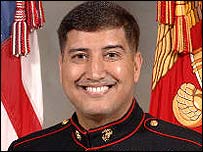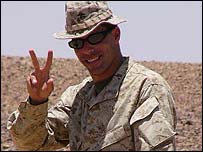Arab-Americans have been fighting in Iraq since the very beginning of the conflict there. Many simply see it as their duty to serve their homeland, America.
Others who have ended up on the frontlines in the so-called "war on terror" have suffered a crisis of conscience, having had to fight fellow Arabs and Muslims as the "enemy".
Three Arab-American marines tell their stories.
JAMAL BAADANI
Jamal Baadani is a gunnery sergeant currently stationed at Quantico Marine Corp Base in Washington DC. He served in Yemen for Operation Enduring Freedom, and won three awards for his services. He is also the founder of Apaam, the Association of Patriotic Arab-Americans in the Military - prompted by the backlash of racism he and his family were subjected to after the 11 September attacks on New York and Washington in 2001.

Jamal Baadani founded Apaam in response to racist abuse
|
 I was born and raised in Cairo, Egypt - my parents were from Yemen - and I came to the United States when I was 10.
I was born and raised in Cairo, Egypt - my parents were from Yemen - and I came to the United States when I was 10.
I didn't know any English, but I was always interested in the military - as I grew up during the Yom Kippur war of 1973. That environment made Egyptians feel patriotic, nationalistic.
It was about caring for your nation, serving your nation. When I was in Egypt, that was Egypt. But when I came to the US, I realised this is my country now.
My father didn't want me to join the military - not because he thought the military was bad, but because he thought I was going to be a doctor, a lawyer or an engineer.
After 9/11, my uncle, who had worked for a large car manufacturer for over 30 years, called me crying - saying 'please send me a picture of you in uniform; I need to prove my patriotism to my fellow workers.'
I was out with a couple of my marines, and a woman came up to say 'I want to thank you for serving our country, especially at this time.'
Then she asked me where I was from. When I said, 'Egypt', she had this look on her face and she said, 'you're a terrorist.' And that was in a Marine Corp uniform.
I cussed her out - I called her every name under the sun. I'm an American too - how dare she tell me I was something different.
But our community sometimes does that to our own. They say, 'you're not worthy, because you're serving the military.' But they don't understand that we're serving and helping the community.
When it comes to self-determination, who has the right to tell someone what they are and what they are not - just because it does not fit with their image?

MUHAMMED KHALED
Born to a Palestinian father and American mother, Mohammad Khaled joined the US Marines in 2000 to pay for his education. Three years later he found himself in Iraq. He left in 2006, after an incident in which he was left stranded while trying to save three children from incoming fire. He now works as a car salesman.

Muhammed Khaled found himself the target of young stone-throwers
|
 I'm a Palestinian American. I'm proud of what I am.
I'm a Palestinian American. I'm proud of what I am.
Unfortunately the government kicks in, which is like the military - and your heart starts splitting in half.
Ironically, our enemy usually is somewhere in the Middle East - it's my cousins, my family.
I was drawn to the Marines not necessarily by the action, but by the discipline and the order - how the military life is. It is not civilian; it has rules and regulations.
I really thought this would do it for me. I thought I would do four years of active service - I didn't even know about the inactive reserves; I did not know that you really sign up to eight years, not four.
When you get to Nashville, everything changes. A recruiter reminds me of what I do right now, as a car salesman. I'm trying to sell you a car, whether you like it or not.
I'd like you to like it, because it'll make my life easier. But I know you need wheels.
I'll be honest - I think it was kind of like brainwashing. You start wanting to believe that you're going there to help.
When I was a kid, I was one of those guys that threw rocks at the Israelis, and I was really good at it.
I became so good at it I became famous for it. Seriously, the only thing that got me out of trouble was my American passport.
In the summer of 2004, we were in the city of Haditha in Iraq, in a convoy tippy-toeing around.
We were so scared, it wasn't funny. I was shaking. As we passed the Haditha Middle School, we got a shower of rocks. They were flying off my flak jacket and my helmet.
I felt so tiny, and so fogged-up with emotion. Because that kid throwing rocks used to be me.
A rock hit me at the heart. I kept it.

RAJAI HAKKI
Rajai Hakki is Muhammed Khaled's friend, and served with him in Iraq between 2003 and 2006, when he was honourably discharged. He comes from a privileged family of Syrian origin.

Rajai Hakki was on the New York Times front page when war began
|
 For me, it was very straightforward - we were going into Iraq to get rid of a dictator.
For me, it was very straightforward - we were going into Iraq to get rid of a dictator.
So I told my unit that I spoke Arabic - and I wanted to go to Iraq and be part of the war.
I wanted to be a Marine. I wanted to fight.
We're Muslim. Islam teaches us to be a good citizen. For me at that time, that is here in America.
This is my country now. This is where my children were born. This is where I'm going to die. This is the country that is providing my family hope and the pursuit of dreams.
In Iraq I worked as a translator for the interrogation teams.
We caught this guy, and he gave out 25 names or so. We went on an arresting spree.
I went in there, and began a quick investigation. I started noticing something - all of the last names were the same. I thought there was something fishy here.
I started asking questions - and sure enough, they were all the same family. This guy had revenge in mind. He was one of the cousins - he named his own father - because daddy did not approve of him marrying.
I dug deeper - it turns out he was so annoyed with his family he wanted them all sent to Abu Ghraib. The family was released.
In Iraq, they tell you there's a smell of death - and there is.
It's nasty, it makes you nauseous. You end up having to shoot the dogs - because you'll see dogs in the street with human parts, like hands, in their mouths.
I am not going to defend anybody - but unfortunately, as much as we tried not to kill civilians, some do get killed. We gave a big warning for civilians to leave the towns, but some have nowhere to go.
Once you've seen the first kid that died, and the first woman - later on, it got so normal, it was just like a movie. You just fast-forward.
My family is afraid of the Syrian intelligence service. My father is blacklisted - he can't go back.
I've been called a 'race traitor' - and that hurts, because I consider myself an Arab-American. I love the Arab world, and I love my Arab roots. And I really miss Syria, I wish I could go back.



